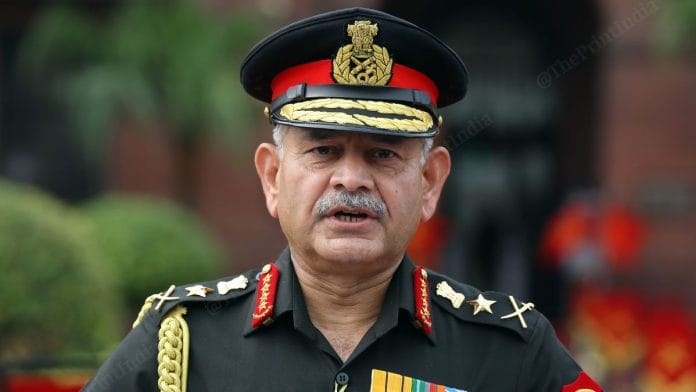New Delhi: Notwithstanding what he termed “positive signalling” coming in from the diplomatic side, Army chief General Upendra Dwivedi Tuesday said the military commanders will have to make decisions and India wants both countries to go back to pre-May 2020 status quo.
He also said that with China, “you have to compete, you have to cooperate, you have to coexist, you have to confront and contest”.
“As far as China is concerned, it has been intriguing our minds for quite some time,” General Dwivedi said, at the opening ceremony of Chanakya Defence Dialogue, which looks at enhancing national and regional security by discussing contemporary issues.
“Positive signalling is coming from the diplomatic side but what we have to understand [is] that the diplomatic side gives you the options and possibilities. But when it comes to the execution on ground, when it relates to the ground per say, it is dependent on the military commanders on both sides to make those decisions,” he added.
Referring to the current situation, General Dwivedi said that it was stable but not normal; instead, sensitive.
“We want the situation that was there pre-April 2020 to be restored, whether in terms of the ground occupation situation or the buffer zone which has been created, or patrolling that has been planned as of now,” he said, explaining what the Army and the country at large want.
As far as the Army considers, the situation will remain sensitive till it is not restored, he added.
General Dwivedi also said that the Army is operationally prepared to face any kind of a contingency that is likely to come through. “In the complete gamut, trust has become the biggest casualty.”
The Army chief said that so far, there have been 17 Corps Commander-level conferences and 21 Working Mechanism for Consultation & Coordination (WMCC) conferences.
These have been impactful because “the low hanging fruits” have been resolved, he added. “Now, when it comes to the difficult situations, where we have a different perception from both sides, it means that both sides need to have a negotiation win-win situation.”
He said that both the diplomatic sides had given some indications and now, the military sides would sit together and see how this could be translated on ground. “Everything we can think of is on the table along the northern front, and it also includes Depsang and Demchok.”
Also Read: A fitness & fighter aircraft enthusiast, who is Air Marshal AP Singh, the next Chief of Air Force
China’s ‘artificial immigration’
Regarding construction of villages in China, the Army chief said that the neighbouring country was carrying out “artificial immigration” or “artificial settlement”.
He compared the situation with that of the South China Sea, hinting at China’s grey zone tactics. “When you are talking about the grey zone, initially, we find fishermen and those kinds of the people who are at the forefront, and in order to save them, you find the military [come in].”
The Army chief added that it was leading to the same kind of a grey zone warfare where the “causation may look very simple but it may have a grandiose design behind it”.
Referring to pager blasts in Israel and the war in West Asia, he said, “Supply chain interruption and interception is something we have to be watchful of. Various levels of inspection are required on all these issues, both at the technological level and manual level, to make sure such things do not get repeated.”
About the fast-changing nature of technology and Atmanirbharta, General Dwivedi said it was moving so fast that there was a need for the standard acquisition procedure and technology acquisition to be decoupled. “We are working towards that.”
(Edited by Radifah Kabir)
Also Read: Indigenous aircraft carrier INS Vikrant joins Navy’s Western Fleet, ready for deployment






